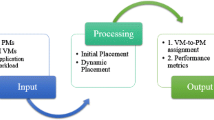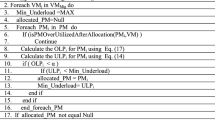Abstract
Since service level agreement (SLA) is essentially used to maintain reliable quality of service between cloud providers and clients in cloud environment, there has been a growing effort in reducing power consumption while complying with the SLA by maximizing physical machine (PM)-level utilization and load balancing techniques in infrastructure as a service. However, with the recent introduction of container as a service by cloud providers, containers are increasingly popular and will become the major deployment model in the cloud environment and specifically in platform as a service. Therefore, reducing power consumption while complying with the SLA at virtual machine (VM)-level becomes essential. In this context, we exploit a container consolidation scheme with usage prediction to achieve the above objectives. To obtain a reliable characterization of overutilized and underutilized PMs, our scheme jointly exploits the current and predicted CPU utilization based on local history of the considered PMs in the process of the container consolidation. We demonstrate our solution through simulations on real workloads. The experimental results show that the container consolidation scheme with usage prediction reduces the power consumption, number of container migrations, and average number of active VMs while complying with the SLA.
Similar content being viewed by others
Explore related subjects
Discover the latest articles and news from researchers in related subjects, suggested using machine learning.References
Buyya R, Ramamohanarao K, Leckie C, Calheiros R N, Dastjerdi A, Versteeg S. Big data analytics-enhanced cloud computing: challenges architectural elements, and future directions. In: Proceedings of the 21st IEEE International Conference on Parallel and Distributed Systems. 2015, 75–84
Zheng K, Wang X, Li L, Wang X. Joint power optimization of data center network and servers with correlation analysis. In: Proceedings of IEEE Conference on Computer Communication. 2014, 2598–2606
Piraghaj S F, Dastjerdi A, Calheiros R N, Buyya R. A framework and algorithm for energy efficient container consolidation in cloud data centers. In: Proceedings of IEEE International Conference on Data Science and Data Intensive Systems. 2015, 368–375
Ma H, Wang L, Tak B, Wang L, Tang C. Auto-tuning performance of MPI parallel programs using resource management in container-based virtual cloud. In: Proceedings of the 9th IEEE International Conference on Cloud Computing. 2016, 545–552
Li L, Tang T, Chou W. A rest service framework for fine-grained resource management in container-based cloud. In: Proceedings of the 8th IEEE International Conference on Cloud Computing. 2015, 645–652
Mouat A. Using Docker: Developing and Deploying Software with Containers. California: O’Reilly Media, Inc. 2015
Hoenisch P, Weber I, Schulte S, Zhu L, Fekete A. Four-fold autoscaling on a contemporary deployment platform using docker containers. In: Proceedings of IEEE International Conference on Service-Oriented Computing. 2015, 316–323
Paraiso F, Stephanie C, Yahya A D, Merle P. Model-driven management of docker containers. In: Proceedings of the 9th IEEE International Conference on Cloud Computing. 2016, 718–725
Affetti L, Bresciani G, Guinea S. aDock: a cloud infrastructure experimentation environment based on open stack and docker. In: Proceedings of the 8th IEEE International Conference on Cloud Computing. 2015, 203–210
Piraghaj S F, Dastjerdi A, Calheiros R N, Buyya R. Efficient virtual machine sizing for hosting containers as a service. In: Proceedings of IEEEWorld Congress on Services. 2015, 31–38
Beloglazov A, Buyya R. Managing overloaded hosts for dynamic consolidation of virtual machines in cloud data centers under quality of service constraints. IEEE Transactions on Parallel and Distributed Systems, 2016, 24(7): 1366–1379
Beloglazov A, Buyya R. Optimal online deterministic algorithms and adaptive heuristics for energy and performance efficient dynamic consolidation of virtual machines in cloud data centers. Concurrency and Computation: Practice and Experience, 2012, 24(13): 1397–1420
Farahnakian F, Liljeberg P, Plosila J. LiRCUP: linear regression based CPU usage prediction algorithm for live migration of virtual machines in data centers. In: Proceedings of the 39th EUROMICRO Conference on Software Engineering and Advanced Applications. 2017, 357–364
Piraghaj S F, Dastjerdi A, Calheiros R N, Buyya R. Container-CloudSim: an environment for modeling and simulation of containers in cloud data centers. Software-Practice and Experience, 2017, 47(4): 505–521
Bobroff N, Kochut A, Beaty K. Dynamic placement of virtual machines for managing SLA violations. In: Proceedings of the 10th IFIP/IEEE International Symposium on Integrated Network Management. 2007, 119–128
Farahnakian F, Pahikkala T, Liljeberg P, Plosila J, Tenhunen H. Utilization prediction aware VM consolidation approach for green cloud computing. In: Proceedings of the 8th IEEE International Conference on Cloud Computing. 2015, 381–388
Chen L, Shen H. Consolidating complementary VMs with spatial/temporal-awareness in cloud datacenters. In: Proceedings of IEEE Conference on Computer Communication. 2014, 1033–1041
Wang S, Zhou A, Hsu C, Xiao X, Yang F. Provision of data-intensive services through energy-and QoS-aware virtual machine placement in national cloud data centers. IEEE Transactions on Emerging Topics in Computing, 2016, 4(2): 290–300
Liu J, Wang S, Zhou A, Xu X, Kumar S A P, Yang F. Towards bandwidth guaranteed virtual cluster reallocation in the cloud. The Computer Journal, 2018, 61(9): 1284–1295
Liu Z, Wang S, Sun Q, Zou H, Yang F. Cost-aware cloud service request scheduling for SaaS providers. The Computer Journal, 2014, 57(2): 291–301
Ghribi C. Energy efficient resource allocation in cloud computing environments. Institut National des Télécommunications, 2014
Dong Z, Zhuang W, Rojas-Cessa R. Energy-aware scheduling schemes for cloud data centers on google trace data. In: Proceedings of IEEE Online Conference on Green Communications. 2014, 1–6
Spicuglia S, Chen L, Birke R, Binder W. Optimizing capacity allocation for big data applications in cloud datacenters. In: Proceedings of IFIP/IEEE International Symposium on Integrated Network Management. 2015, 511–517
Yaqub E, Yahyapour R, Wieder P, Jehangiri A, Lu K, Kotsokalis C. Metaheuristics-based planning and optimization for SLA-aware resource management in PaaS clouds. In: Proceedings of the 7th IEEE/ACM International Conference on Utility and Cloud Computing. 2014, 288–297
Zhang H, Ma H, Fu G, Yang X, Jiang Z, Gao Y. Container based video surveillance cloud service with fine-grained resource provisioning. In: Proceedings of the 9th IEEE International Conference on Cloud Computing. 2016, 759–765
Liu J, Wang S, Zhou A, Kumar S A P, Yang F, Buyya R. Using proactive fault-tolerance approach to enhance cloud service reliability. IEEE Transactions on Cloud Computing, 2018, 4: 1191–1202
Ali-Eldin A, Tordsson J, Elmroth E. An adaptive hybrid elasticity controller for cloud infrastructures. In: Proceedings of IEEE International Conference on Network Operations and Management Symposium. 2012, 204–212
Di S, Kondo D, Cirne W. Host load prediction in a Google compute cloud with a Bayesian model. In: Proceedings of ACM International Conference on High Performance Computing, Networking, Storage and Analysis. 2012, 1–11
Mao M, Humphrey M. A performance study on the VM startup time in the cloud. In: Proceedings of the 5th IEEE International Conference on Cloud Computing. 2012, 423–430
Park K, Pai V S. CoMon: a mostly-scalable monitoring system for PlanetLab. ACM SIGOPS Operating Systems Review, 2006, 40(1): 65–74
Tomás L, Tordsson J. An autonomic approach to risk-aware data center overbooking. IEEE Transactions on Cloud Computing, 2014, 2(3): 292–305
Acknowledgements
The work presented in this paper was supported by the NSFC (Grant Nos. 61472047 and 61602054), and Beijing Natural Science Foundation (4174100).
Author information
Authors and Affiliations
Corresponding author
Additional information
Jialei Liu is an assistant professor at School of Computer and Communication Engineering, Zhengzhou University of Light Industry, China. He received his PhD degree at Beijing University of Posts and Telecommunications, China in 2018. He received his ME in computer science and technology from Henan Polytechnic University, China in 2008. His research interests include cloud computing and Edge/Fog computing.
Shangguang Wang received his PhD degree at Beijing University of Posts and Telecommunications (BUPT), China in 2011. He is an associate professor at the State Key Laboratory of Networking and Switching Technology, BUPT. He has published more than 100 papers, and played a key role at many international conferences, such as general chair and PC chair. His research interests include service computing, cloud computing, and mobile edge computing. He is a senior member of the IEEE, and the Editor-in-Chief of the International Journal of Web science.
Ao Zhou is an assistant professor at the State Key Laboratory of Networking and Switching Technology, Beijing University of Posts and Telecommunications (BUPT), China. She received her PhD degree in computer science at BUPT in 2015. Her research interests include cloud computing and service reliability.
Jinliang Xu received the bachelor’s degree in electronic information science and technology from Beijing University of Posts and Telecommunications (BUPT), China in 2014. Currently, he is a PhD candidate in computer science at the State Key Laboratory of Networking and Switching Technology, BUPT. His research interests include Mobile Cloud Computing, Service Computing, Information Retrieval, and Crowdsourcing.
Fangchun Yang received his PhD in communications and electronic systems from the Beijing University of Posts and Telecommunication (BUPT), China in 1990. He is currently a professor at BUPT, China. He has published six books and more than 80 papers. His current research interests include network intelligence, service computing, communications software, soft-switching technology, and network security. He is a fellow of the IET.
Electronic supplementary material
Rights and permissions
About this article
Cite this article
Liu, J., Wang, S., Zhou, A. et al. SLA-driven container consolidation with usage prediction for green cloud computing. Front. Comput. Sci. 14, 42–52 (2020). https://doi.org/10.1007/s11704-018-7172-3
Received:
Accepted:
Published:
Issue Date:
DOI: https://doi.org/10.1007/s11704-018-7172-3




